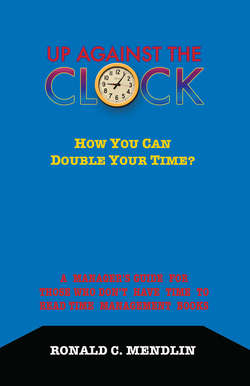Читать книгу Up Against The Clock: How You Can Double Your Time? - Ronald C. Mendlin - Страница 23
На сайте Литреса книга снята с продажи.
FILING SYSTEM
ОглавлениеA good filing system is a joy, because it allows you to know exactly where to find what you need when you need it. But a filing system cannot be as personal as a list or calendar, because other people may also need to access your files, either now or in the future.
The following simple principles can help to streamline just about any filing system.
Whenever you file something that is related to an action you must take in the future, make a note about it on one of your to-do lists immediately, so that it doesn’t become a casualty of “out of sight, out of mind.”
Give your files specific descriptive names. If you have several documents that you cannot easily categorize, and you think you may need them in the near future, a miscellaneous temporary folder can be useful. But don’t let documents “live” in this folder for long; categorize and file them as quickly as possible, and don’t let this folder expand to more than ten documents.
Before putting a document in a file, first ask yourself: What general subject is most likely to come to your mind? When you go back to look for that document, make sure it is filed under the general subject that comes to your mind.
In your file drawers, don’t place your file tabs directly behind each other. Stagger them from left to right for better visibility.
Better yet, have open file shelves (or “vertical files”) in your office for your most-used files, keeping the file folders in a vertical position so that they’re easy to see and access.
Generally speaking, it’s better to have fewer, fatter files than many tiny ones. This makes it much easier to remember where you filed any given document. However, if files become huge or unwieldy, you should divide them.
Purge your files of outdated or unneeded documents on a regular basis. Send historical documents to an archive. Toss the others. Most data has a “shelf life” of no more than five years.
If you’ve inherited files that reside in your drawers, but which you yourself do not need, get them out of your personal work space. Send them to an archive, or just put them in the recycle bin if no one will ever need them.
Always place the most recent documents at the front of your files.
Unfold papers before you file them.
Don’t put envelopes into your file folders; they take up unnecessary space.
Always keep extra file folders handy, but not on your desktop!
